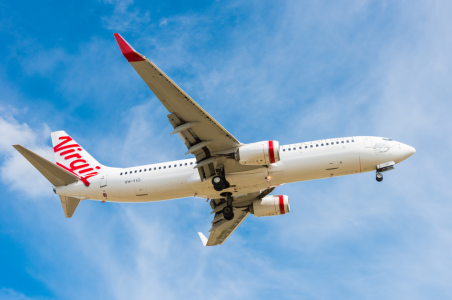Are your airfares set to soar? Virgin Australia's grim news for travellers amid emission reductions
Times have changed, and while many have become accustomed to travelling at an affordable price, that might not last much longer.
Virgin Australia's Chief of Corporate Affairs, Christian Bennett, recently warned travellers that airfares would likely increase as the airline marches towards a greener carbon footprint.
He was talking at a parliamentary hearing on the cost of living and brought up the government's updated Safeguard Mechanism, which took effect last July.
The Safeguard Mechanism is the government’s policy for reducing emissions at the country’s largest industrial facilities.
This limits the greenhouse gases from large industrial facilities to 43 per cent below 2005 levels by 2030 and net zero by 2050.
Virgin Australia needs to r reduce its share of emissions by 4.9 per cent in compliance with the standards set by the policy.
While Bennett agrees with the aims of the mechanism, he did lament that the path to a cleaner carbon footprint comes at a cost.
The company can do it best by switching to sustainable jet fuel (SAF)–a 'greener' version of conventional jet fuel that produces 80 per cent less pollution.
‘There is no escaping the challenge of sustainable aviation fuel. The technology is not the problem–actually making sustainable aviation fuel is not the problem. Economics is the problem,’ Bennett said.
The major issue with SAF is its increased cost–it's reportedly two to five times more expensive than regular jet fuel, making up a quarter of Virgin Australia's operation costs.
‘Public policy will need to play a very significant role if the transition from current jet fuel over to sustainable aviation fuel is to happen at an affordable price,’ Bennett explained.
The raw material needed for the production of sustainable fuel is being exported to the US and Singapore, but domestic fuel production could bring down the prices and emissions at the same time.
If the airline wants to meet the requirements of the Safety Mechanism, they will have to begin using SAF, thereby putting airfares up by as much as 500 per cent.
Bennett described SAF as the 'slingshot' to net zero, but until its cost comes down significantly, the airline will have to stick with using a 30 per cent blend of conventional and greener fuels until they can find a way to drive the cost of SAF down.
Despite the cost, Virgin Australia affirmed that they are aligned with the Safeguard Mechanism’s goals.
‘We as a company and as an industry need to be moving down this path,’ Bennett said.
‘The Safeguard Mechanism is just our domestic framework within which we’re going to have to accomplish the task. If we fall short, then we will have to face the consequences.’
‘So I’ve described the two (cost and the safeguard mechanism) as working in parallel rather than at odds,’ Bennet stated.

What do you think of this story, members? Share your thoughts in the comments below!
Virgin Australia's Chief of Corporate Affairs, Christian Bennett, recently warned travellers that airfares would likely increase as the airline marches towards a greener carbon footprint.
He was talking at a parliamentary hearing on the cost of living and brought up the government's updated Safeguard Mechanism, which took effect last July.
The Safeguard Mechanism is the government’s policy for reducing emissions at the country’s largest industrial facilities.
This limits the greenhouse gases from large industrial facilities to 43 per cent below 2005 levels by 2030 and net zero by 2050.
Virgin Australia needs to r reduce its share of emissions by 4.9 per cent in compliance with the standards set by the policy.
While Bennett agrees with the aims of the mechanism, he did lament that the path to a cleaner carbon footprint comes at a cost.
The company can do it best by switching to sustainable jet fuel (SAF)–a 'greener' version of conventional jet fuel that produces 80 per cent less pollution.
‘There is no escaping the challenge of sustainable aviation fuel. The technology is not the problem–actually making sustainable aviation fuel is not the problem. Economics is the problem,’ Bennett said.
The major issue with SAF is its increased cost–it's reportedly two to five times more expensive than regular jet fuel, making up a quarter of Virgin Australia's operation costs.
‘Public policy will need to play a very significant role if the transition from current jet fuel over to sustainable aviation fuel is to happen at an affordable price,’ Bennett explained.
The raw material needed for the production of sustainable fuel is being exported to the US and Singapore, but domestic fuel production could bring down the prices and emissions at the same time.
If the airline wants to meet the requirements of the Safety Mechanism, they will have to begin using SAF, thereby putting airfares up by as much as 500 per cent.
Bennett described SAF as the 'slingshot' to net zero, but until its cost comes down significantly, the airline will have to stick with using a 30 per cent blend of conventional and greener fuels until they can find a way to drive the cost of SAF down.
Despite the cost, Virgin Australia affirmed that they are aligned with the Safeguard Mechanism’s goals.
‘We as a company and as an industry need to be moving down this path,’ Bennett said.
‘The Safeguard Mechanism is just our domestic framework within which we’re going to have to accomplish the task. If we fall short, then we will have to face the consequences.’
‘So I’ve described the two (cost and the safeguard mechanism) as working in parallel rather than at odds,’ Bennet stated.
Key Takeaways
- Travellers may face increased ticket prices as airlines attempt to cut their emissions in line with government regulations.
- Virgin Australia's Chief of Corporate Affairs, Christian Bennett, stated that sustainable aviation fuel (SAF), although a cleaner alternative, is two to five times more expensive than commercial jet fuel.
- As fuel constitutes a quarter of the airline's operating costs, a potential 500 per cent increase in fuel prices poses a significant challenge to maintaining affordable airfares.
- Despite the financial challenges, Virgin Australia is committed to achieving the safeguard mechanism's goals and has gradually begun to use blends of conventional and greener fuels to lower emissions.
What do you think of this story, members? Share your thoughts in the comments below!








